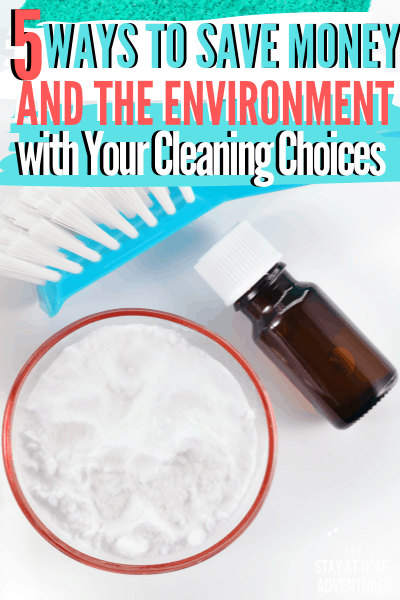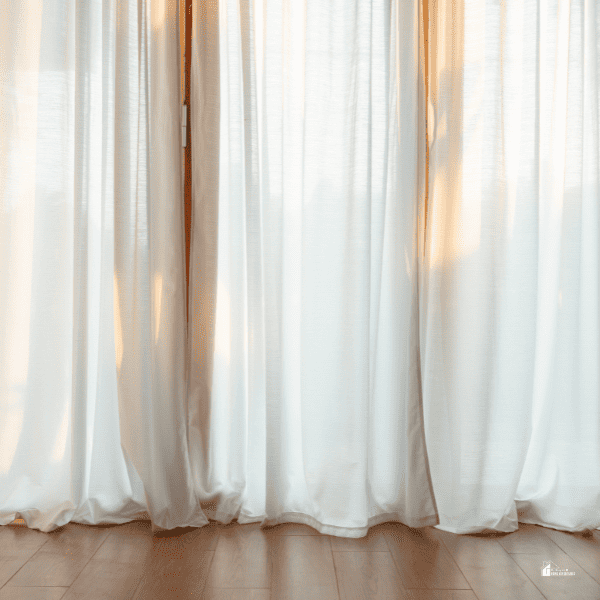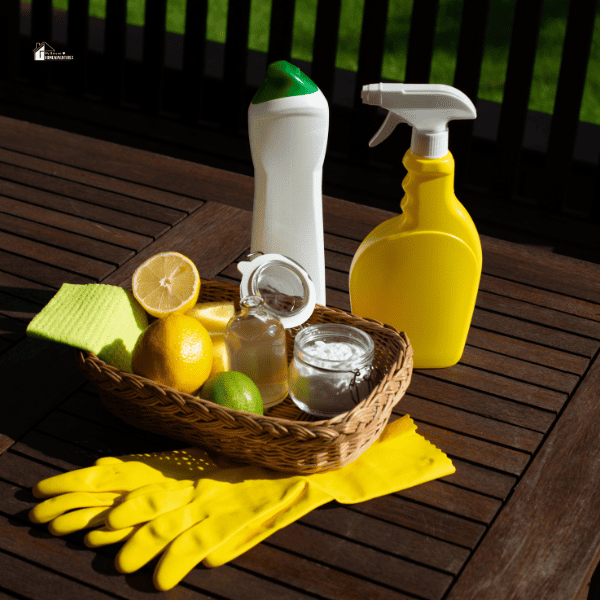Save Money and the Environment with Your Cleaning Choices
This post may contain affiliate links which might earn us money. Please read my Disclosure and Privacy policies hereSince cleaning is one of the most regular things you have to do in your home, it pays to look for ways to cut costs in this area.
While you can buy generic cleaning brands or bulk cleaning supplies to save money, it’s hard to go past the cost savings that come with using simple ingredients and homemade solutions.
When you go down this path, you also get to avoid being exposed to all the heavy chemicals found in store-bought products. This means a healthier home and life for you, your family, and your pets, plus less impact for the environment.
There are many great natural cleaning options you can start using ASAP to get your home sparkling clean.
Take a look through your pantry, fridge, and cupboards, and you may already have some of the main ingredients you need sitting there ready.

How You Can Save Money and the Environment with Your Cleaning Choices
Baking Soda
One of the most essential items for natural cleaning is baking soda, or sodium bicarbonate as it’s officially called.
What does baking soda do?
This product is beneficial because it naturally absorbs odors and deodorizes.
Also, being slightly abrasive, it works well for scouring tasks. It’s a great option to use to combat grease, proteins, and animal waste.
To use baking soda, which comes as a powder, sprinkle it liberally onto the area you want to clean.
Scrub the spot with a damp cloth for new or surface-level stains that remove easily.
For baked-on, deeper issues, combine the power of baking soda with the fizziness effect of vinegar, as the two react.
Alternatively, mix baking soda with water to create a cleaning paste.
Baking soda, typically when combined with other ingredients, does a great job of cleaning the oven, barbecue tools, grills, walls with scuff marks, garden tools, stove burner grates, stained dishes, and upholstered furniture.
You can also use it to help unclog drains – pour the soda down first, then some vinegar, and, once the effervescent effect arises, follow this with a kettle-full of hot water.
Related posts:
- Do Pinterest Hacks Really Work? Professional Cleaners Weigh In
- Simple Living Tips For You and Your Home
- 10 Essential Oil Combinations to Diffuse
Vinegar
Distilled white vinegar is another natural cleaning product you need to have in your toolkit. It’s acidic and as such powerful against alkaline sites.
While the smell by itself isn’t all that lovely, you can pair it with a few drops of an essential oil to disguise the aroma.
Vinegar is a wonder when it comes to removing stains caused by things like coffee, tea, and wine, as well as rust stains, and it helps to dissolve tarnish, mineral deposits, and scale.
Use it to cut through soap scum and wax buildup, and to inhibit mold, mildew, and some bacteria.
Use diluted vinegar to disinfect dishwashers and to clean walls and windows, as well as dirty showerheads, glasses, and dishes.
It’s the perfect choice for a homemade floor cleaner, too, and when paired with other ingredients, such as baking soda, it’s ideal for unclogging drains.
Plus, if you’re wondering how to clean your oven racks without resorting to toxic chemicals, vinegar is your friend. Use it with baking soda, combined with plenty of elbow grease for scrubbing.
Note, too, that anytime you’re cleaning items with heavy buildup on them, you’ll need to give vinegar more time to work.
It pays to soak a cloth in the substance and then lay this over the affected area for at least an hour. This longer timeframe will give the vinegar enough of a chance to soak in and work wonders.
Salt
Another item in your kitchen already that you might not have thought to use in cleaning is salt.
It’s a powerful natural cleaning option because of its abrasive properties. While table salt is the most common and the cheapest, courser salts like kosher and sea salt, to name just two, work particularly well, too.
Use salt for scouring jobs either by itself, added to a paste with vinegar, used in conjunction with lemon, or another combination, depending on your needs.
It’s great for lifting grime off stove grates and oven racks and removing hard-water stains from dishes and glassware. You can use it to clean wooden tables, pots and pans, countertops, and artificial flowers, too.
Lemon
Lemon is nature’s true cleaner – think about its lovely fresh smell, for a start.
The citrus fruit contains acid helpful for removing a wide variety of deposits, stains, scum, dirt, etc. It’s particularly beneficial when used in tandem with some of the other products listed above.
The best way to use lemons is to squeeze them for their juice. Use this liquid in your cleaning sprays and other mixes.
Alternatively, for a fast cleaning tool, cut a lemon in half and place the wedges directly on dirty surfaces. Plus, keep in mind that nothing has to go to waste. You can actually use lemon peel in your cleaning, too.
Lemon usually works best when left to work its magic on surfaces for half an hour or so. This allows the enzymes to be most effective.
Utilize lemon when you need to remove hard-water deposits from glassware and soap scum in wet areas, and pop some in your garbage disposal unit where it can do its job as a natural deodorizer.
It’s also helpful on grout, appliances, cutting boards, faucets, cupboards, and some countertops. Note that lemon juice can lead to discoloration on some delicate and porous surfaces, such as marble, so be careful not to use it directly here.
Essential Oils
Essential oils are also good choices when cleaning your home naturally. These are naturally antibacterial, and you’ll find that not only do they smell good, but there is an oil to suit every need. They can disinfect, remove stains, purify, and repel bugs and other nasties.
One of the best essential oils to stock up on is peppermint. Place ten to 15 drops of it in about a cup of water to create a spray for deterring insects like cockroaches and ants. It also makes for a simple all-purpose cleaner when combined with vinegar, lemon juice, and water.
Lavender essential oil is also helpful. Use it in your wardrobe to keep moths and the like away, or rub some onto light bulbs (when they’re switched off and cool) to repel mosquitos and other insects. Lavender oil is also a beneficial component of a homemade antibacterial cleaning solution.
Some people initially think that cleaning with homemade solutions is going to take more time and effort than buying products from stores.
However, you probably already have many of these items in your home, and can use them quickly and easily. Better yet, they won’t harm the health of anyone in your family, your pets, or the environment.
Your read 5 Ways To Save Money and the Environment with Your Cleaning Choices now we want to know what are your thoughts about it. Share them with us.
Bio: Tiffani is a leader in marketing authority, she prides herself in her ability to create and provide high-quality content that audiences find valuable.
She also enjoys connecting with other bloggers and collaborating for exclusive content in various niches. With many years of experience, Tiffani has found herself more passionate than ever to continue developing content and relationship across multiple platforms and audiences.







One Comment